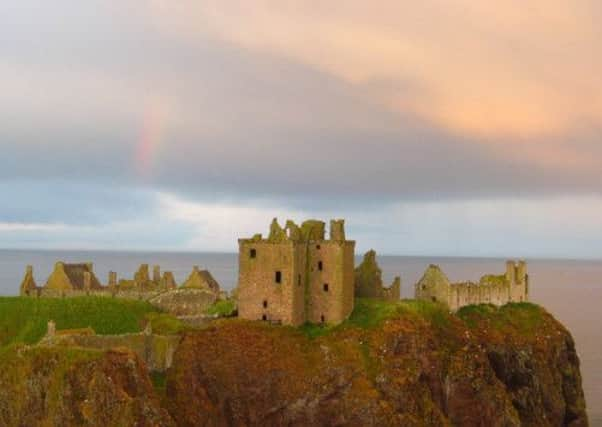Dunnottar Castle forced to close over safety fears


Dunnottar Castle, one of Scotland’s most spectacular ruined fortresses, was placed seventh in the global vote last week.
But Dunecht estates, which owns the castle near Stonehaven in Aberdeenshire , has now announced that the fortress is to be closed until further notice due to the need to carry out urgent repairs to the roof of one of the main buildings on the approach to the main castle complex.
Advertisement
Hide AdThe castle, which inspired Princess Merida’s family home in Disney-Pixar’s Brave and doubled for Elsinore in Franco Zeffirelli’s Hamlet, is normally only closed to the public for two days at Christmas and two days at New Year.
A notice, posted on the castle’s website, states: “It seems a shame to follow all the good new of recent times with some bad news, but we regret to say that Dunnottar Castle will remain closed indefinitely at the moment due to urgent repairs required to Benholm’s Lodging roof.
“The castle will remain closed to allow scaffolding to be erected in the first place to ensure the health and safety of castle visitors and staff while works are assessed. “
The statement continues: “Those of you who know the castle well will know that this is the huge building which looms over you as you climb the steps up to the castle entrance. These works were scheduled for next year but circumstances have dictated that they must be done now, to ensure the health and safety of our visitors and staff. It is a sad day for all of the staff and management team involved here but safety must come first. “
Wendy Sylvester, the custodian at Dunnottar Castle, said: “We are planning to put scaffolding up around the building next week to allow people to come in, but we are not sure how long that is going to take. We will then asses the work that needs to be done to the roof so visitors can still come to the castle.
“But we are saying the castle will be closed ‘indefinitely’ at the moment because are not sure how long it is going to take.
Advertisement
Hide AdMs Sylvester: explained “Benholm’s Lodging is a big building right above the entranceway to the castle. The roof is in need of repair. We had been planning to do the roof next summer but it has just come to light that we probably need to give it some attention now.
“We are normally one of the few castle that are open at this time of the year. We are only closed on Christmas Day and Boxing Day and 1 and 2 January. We don’t close for six months of the year like some other castles which can do all these works as a matter of course every year.”
Advertisement
Hide Adms Sylvester added: “We have had a lot of extra visitors since the publicity about the eighth wonder of the world competition. And it’s a shame that there are now all these visitors with nowhere to go.”
Dunnottar Castle was recently awarded a Certificate of Excellence from TripAdvisor, placing them in the top-performing ten per cent of all businesses worldwide on the travel website.
There has been a keep on the rocky headland which dominates Stonehaven since the Middle Ages. William Wallace, Mary Queen of Scots, the Marquis of Montrose and King Charles II have all graced the castle with their presence.
The castle was besieged by William Wallace in 1297 and later became the seat of the Earls Marischal, one of the most powerful families in Scotland.
In the 17th Century the castle played a key role in Scottish history when its small garrison held out against a siege by Oliver Cromwell’s army for eight months. The Earl Marischal had been given the “Honours of Scotland” - the Scottish Crown Jewels - for safekeeping and the Crown, sceptre and sword were successfully smuggled past Cromwell’s blockade.
The ruins also include the “Whig’s Vault” where a group of Covenanters, who refused to acknowledge the King’s supremacy in spiritual matters, were imprisoned in 1685.